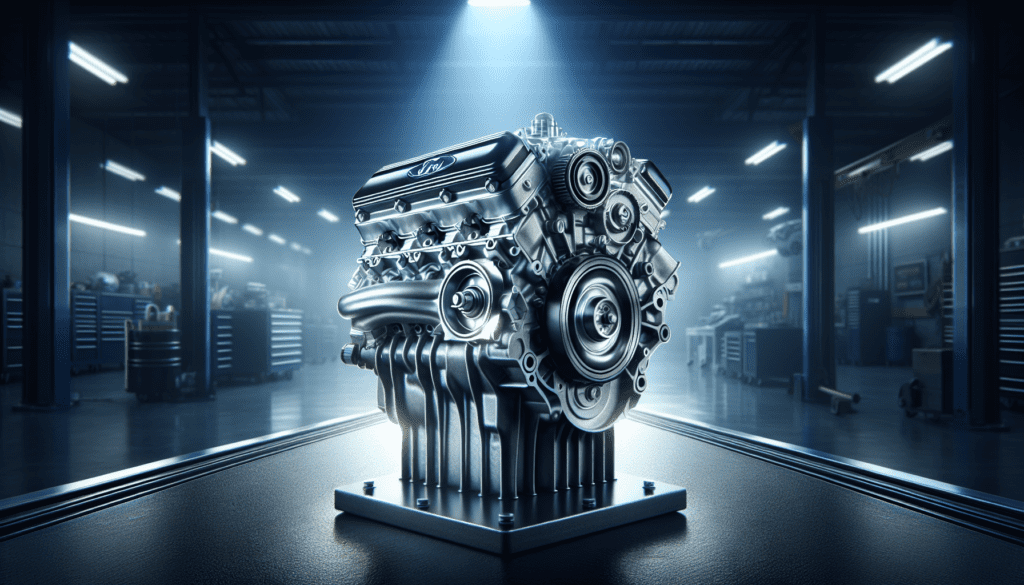Are you a Ford enthusiast looking to maximize the performance of your vehicle? If so, then it’s time to delve into the world of dyno tuning. In this article, you will discover the ins and outs of dyno tuning and why it is a game-changer for Ford Performance. From understanding the process to uncovering its benefits, get ready to take your Ford to new heights with this comprehensive guide.
What is Dyno Tuning?
Definition of Dyno Tuning
Dyno tuning, also known as dynamometer tuning, is a process of optimizing the performance of a vehicle’s engine by fine-tuning its parameters and mapping with the help of a dynamometer. A dynamometer, commonly referred to as a dyno, is a device that measures and analyzes the power output, torque, and other performance metrics of an engine under controlled conditions. Dyno tuning ensures that the engine is running at its peak performance by adjusting variables such as air-fuel mixture, ignition timing, and other engine parameters.
Importance of Dyno Tuning for Ford Performance
Dyno tuning plays a crucial role in maximizing the performance and efficiency of Ford vehicles, particularly those designed for high performance. Ford Performance enthusiasts seek to unleash the full potential of their vehicles, whether it be a Mustang, F-150 Raptor, Focus ST, or any other Ford model. Dyno tuning allows Ford enthusiasts to extract more horsepower, torque, and overall performance from their vehicles, ultimately enhancing the driving experience.
How Dyno Tuning Works
Dyno tuning involves a series of steps that require expertise and precision. Firstly, the vehicle is secured onto the dyno, which simulates real-world driving conditions. Baseline measurements are taken to determine the existing performance of the vehicle. A skilled tuner then adjusts various engine parameters and tests the vehicle on the dyno to assess the impact of each adjustment on performance. Iterations and fine-tuning are carried out until the desired performance gains are achieved. The process typically involves optimizing air-fuel mixture, ignition timing, throttle response, transmission shift points, and other parameters specific to the vehicle.
Advantages of Dyno Tuning
Increased Horsepower and Torque
One of the primary benefits of dyno tuning is the significant increase in horsepower and torque output. By fine-tuning the engine parameters, dyno tuning optimizes the fuel and air mixture for improved combustion, resulting in a substantial boost in power and torque. Ford Performance enthusiasts can expect impressive gains in acceleration, top speed, and overall performance.
Improved Fuel Efficiency
Contrary to popular belief, dyno tuning can actually result in improved fuel efficiency. By optimizing the combustion process and ensuring efficient fuel delivery, dyno tuning eliminates wasteful fuel consumption. This means that while enjoying the increased performance, Ford owners can also experience greater fuel economy and a longer range between fill-ups.
Enhanced Overall Performance
Dyno tuning unlocks the true potential of a Ford vehicle, making it perform at its best in every aspect. Along with increased horsepower and torque, the optimized engine parameters result in smoother power delivery, improved throttle response, and better drivability. The performance gains are not only noticeable in straight-line acceleration but also in the vehicle’s handling, responsiveness, and overall driving experience.
Optimized Engine and Transmission
The benefits of dyno tuning go beyond just the engine. A skilled tuner can also optimize the transmission shifting points, allowing for quicker and more precise gear changes. This translates into improved acceleration, smoother gear transitions, and a more engaging driving experience. Additionally, dyno tuning can help identify and address any potential mechanical issues or inefficiencies, ensuring a properly functioning engine and transmission system.
Better Throttle Response
One of the noticeable improvements of dyno tuning is the enhanced throttle response. By precisely adjusting the engine parameters, the throttle becomes more responsive to driver input, resulting in quicker acceleration and a more engaging driving experience. The vehicle reacts promptly and efficiently to throttle changes, making it more responsive and enjoyable to drive.
Smoother Power Delivery
Another advantage of dyno tuning is that it enhances the smoothness of power delivery. The fine-tuning process ensures that the power is delivered consistently and smoothly throughout the rev range. This eliminates any jerks, hesitations, or flat spots in power delivery, resulting in a more refined and enjoyable driving experience.
Improved Drivability
Dyno tuning improves the overall drivability of a Ford vehicle by optimizing the engine parameters specific to the driver’s preferences. Whether it be enhancing low-end torque for better city driving or maximizing top-end power for spirited highway driving, dyno tuning allows for personalized adjustments tailored to individual driving styles. This personalization ensures that the vehicle performs optimally in various situations, making it more versatile and suitable for different driving conditions.
Reduced Engine Wear and Tear
By ensuring an optimized air-fuel mixture and ignition timing, dyno tuning helps prevent engine damage caused by lean or overly rich fuel mixtures and improper timing. The fine-tuned parameters result in cleaner and more efficient combustion, reducing the likelihood of engine knock, detonation, and other potentially harmful conditions. With reduced stress on the engine components, such as the pistons, valves, and cylinder heads, the engine’s longevity is also extended.
Enhanced Safety and Reliability
Dyno tuning contributes to increased safety and reliability by optimizing the vehicle’s performance and ensuring the engine is running at its peak efficiency. With improved throttle response, smoother power delivery, and better drivability, the driver has better control over the vehicle, especially in critical situations. Furthermore, by fine-tuning the engine parameters, dyno tuning helps identify and address any potential issues before they escalate, ensuring that the vehicle remains reliable and safe to drive.
Personalized Tuning Options
Dyno tuning offers the advantage of personalized tuning options, allowing Ford Performance enthusiasts to tailor their vehicle’s performance to their specific requirements and preferences. Whether one prioritizes maximum horsepower, improved fuel efficiency, or a perfect balance between power and drivability, a skilled tuner can work closely with the driver to achieve the desired performance goals. This level of customization enhances the ownership experience and ensures that the vehicle meets the driver’s unique needs.

Choosing a Dyno Tuning Provider
Experience and Expertise
When it comes to dyno tuning, experience and expertise are paramount. It is crucial to choose a dyno tuning provider with a proven track record and a team of knowledgeable and skilled tuners. Look for providers who specialize in Ford Performance vehicles and have a deep understanding of their specific engine characteristics and tuning requirements.
Quality of Equipment
The quality of equipment used by the dyno tuning provider is another important consideration. Ensure that the provider utilizes modern and reliable dynamometers capable of accurately measuring and analyzing the vehicle’s performance. State-of-the-art equipment ensures precise tuning and reliable results.
Reputation and Customer Reviews
Researching and checking the reputation of a dyno tuning provider is essential in making an informed decision. Consider reading customer reviews and testimonials to gauge the satisfaction and experiences of previous clients. A reputable provider will have a positive reputation built on delivering excellent results and providing exceptional customer service.
Tuning Packages and Pricing
Evaluate the tuning packages offered by different providers and compare their pricing structures. Look for providers that offer comprehensive packages tailored to Ford Performance vehicles, as these typically provide the best value for money. However, beware of providers who offer unrealistically low prices, as the quality of the tuning and services may be compromised.
Customer Support and Aftercare
Consider the level of customer support and aftercare provided by the dyno tuning provider. A good provider will offer ongoing support and assistance even after the tuning session is completed. This includes addressing any concerns or issues that may arise and providing guidance for future modifications or maintenance.
Preparing for a Dyno Tuning Session
Research and Select the Right Tuning Shop
Before scheduling a dyno tuning session, conduct thorough research and select a reputable tuning shop that specializes in Ford Performance vehicles. Look for shops with positive reviews, a competent team, and experience working with the particular Ford model you own.
Ensure Vehicle is in Good Condition
Before bringing your Ford vehicle to the tuning shop, ensure that it is in good overall condition. Take care of any routine maintenance tasks, such as oil changes, filter replacements, and spark plug inspections. Address any known mechanical issues or malfunctions to ensure the vehicle is ready for optimal tuning.
Check and Fix Any Mechanical Issues
Perform a thorough inspection of the vehicle to identify and address any mechanical issues. This includes checking for worn-out belts, hoses, and other components that may need replacement. It is crucial to have a solid foundation before attempting to dyno tune the vehicle to ensure accurate results and to prevent potential damage.
Inspect and Replace Worn Out Parts
If any parts or components are worn out or nearing the end of their lifespan, consider replacing them before the dyno tuning session. This may include items such as worn-out spark plugs, aged ignition coils, or deteriorated sensors. Fresh components will ensure accurate readings and optimum performance during the tuning process.
Clean and Maintain the Fuel System
It is essential to ensure a clean and well-maintained fuel system before dyno tuning. Consider performing a fuel system cleaning to remove any deposits or contaminants that may affect performance. Clean fuel injectors and a properly functioning fuel pump are critical for accurate readings during the tuning process.
Top Up All Fluids
Check and top up all vital fluids such as engine oil, coolant, brake fluid, and transmission fluid. Proper fluid levels are crucial during the dyno tuning session, as the engine will be subjected to rigorous testing. Ensure that all fluids are at their recommended levels to prevent any adverse effects on performance or potential damage to the vehicle.
Empty Excess Weight from the Vehicle
Remove any unnecessary items or excess weight from the vehicle before the dyno tuning session. This includes personal belongings, aftermarket accessories, or additional components that are not required for the tuning process. Minimizing weight will provide accurate performance measurements and optimize the tuning process.
Review Manufacturer Recommendations
Familiarize yourself with the specific tuning recommendations and guidelines provided by the vehicle manufacturer. These recommendations may include specific fuel octane ratings, maintenance intervals, or other instructions that are essential to follow for optimal vehicle performance.
Bring Necessary Documentation and Information
Before heading to the tuning shop, gather all relevant documentation and information related to your vehicle. This can include service records, modifications made, or any specific requirements you may have in terms of tuning preferences. Providing the tuner with complete and accurate information will help them tailor the tuning to your specific needs.
Prepare to Invest Time and Money
Dyno tuning is a meticulous process that requires time, expertise, and specialized equipment. Understand that a successful tuning session may take a few hours or even a full day. Additionally, quality dyno tuning services are an investment, and it is important to budget accordingly to ensure you have access to reputable providers and receive the desired results.

The Dyno Tuning Process
Initial Vehicle Inspection and Baseline Measurements
Upon arrival at the tuning shop, the first step is an initial vehicle inspection. The tuner will assess the overall condition of the vehicle, check for any visible issues, and discuss performance goals with the owner. Baseline measurements are then taken to establish the starting point for tuning.
Adjustment of Key Parameters
Using specialized software and equipment, the tuner will adjust key parameters within the vehicle’s engine management system. This may include optimizing the air-fuel mixture, adjusting ignition timing, modifying throttle response, and fine-tuning other parameters specific to the engine and vehicle model. The goal is to achieve the desired performance while ensuring the engine operates safely and reliably.
Dyno Testing and Monitoring
With the initial adjustments made, the vehicle is secured on the dyno. The dyno simulates real-world driving conditions, allowing the tuner to monitor and measure the vehicle’s performance while making further adjustments. The dyno testing stage involves multiple runs at varying RPMs and loads to capture data and assess performance improvements.
Fine-Tuning and Iterations
Based on the data collected during dyno testing, the tuner iteratively makes further adjustments to achieve the desired performance characteristics. This process involves fine-tuning specific engine parameters, analyzing the impact on performance, and making incremental changes as necessary. The tuner’s expertise and experience play a crucial role in achieving the optimal tuning for the vehicle.
Final Measurements and Performance Testing
Once the tuner is satisfied with the adjustments and performance gains, final measurements are taken to assess the improvements achieved through dyno tuning. This includes measuring horsepower, torque, and other relevant performance metrics. The vehicle may also undergo additional performance testing, such as a road test, to evaluate drivability and verify the overall improvements.
Common Myths and Misconceptions About Dyno Tuning
It Voids the Vehicle Warranty
Contrary to popular belief, properly performed dyno tuning does not automatically void a vehicle’s warranty. However, it is essential to ensure that the tuning is done by a reputable and experienced provider. Some vehicle manufacturers may have specific guidelines regarding modifications and tuning, so it is advisable to review the warranty terms and consult with the dealer or manufacturer before proceeding with dyno tuning.
It Reduces Engine Longevity
Dyno tuning, when performed by a skilled professional using the proper equipment, does not inherently reduce engine longevity. In fact, a well-tuned engine operating within its design limits can potentially have improved longevity compared to an engine with improper tuning or operating conditions. Proper dyno tuning optimizes the engine’s performance and can contribute to a longer and healthier engine lifespan.
It Only Benefits High-Performance Vehicles
While high-performance vehicles often see significant gains from dyno tuning, it is not limited to these vehicles. Dyno tuning can benefit a wide range of Ford vehicles, including sedans, SUVs, and trucks. The specific gains may vary depending on the vehicle’s engine and tuning potential, but improvements in performance, fuel efficiency, and drivability can be achieved irrespective of the vehicle’s performance class.
All Dyno Tuning Shops are the Same
Not all dyno tuning shops are created equal. The level of expertise, equipment quality, and customer support can vary significantly between different providers. It is essential to choose a reputable tuning shop that specializes in Ford Performance vehicles and has a track record of delivering quality results. Take the time to research and select the right provider to ensure a successful and satisfactory dyno tuning experience.
It is Expensive and Time-Consuming
Dyno tuning can indeed be an investment, but the cost will vary depending on the specific tuning package and the provider. While quality dyno tuning services may come with a higher price tag, it is important to consider the long-term benefits and improvements gained from the process. Additionally, the time required for a dyno tuning session can range from a few hours to a full day, depending on the complexity of the tuning process and any additional modifications required.
Additional Considerations for Ford Performance
Compatibility with Ford Performance Parts
If you have installed or plan to install Ford Performance parts or aftermarket modifications in your vehicle, it is crucial to ensure compatibility with the dyno tuning process. Discuss your modifications with the tuning shop to ensure they can accommodate and optimize the performance of these parts during the tuning session. The tuner’s expertise in working with Ford Performance components will help unleash their full potential.
Impact on Factory Emissions and Compliance
Dyno tuning can modify engine parameters to optimize performance, but it is important to consider the impact on factory emissions and compliance with local regulations. Reputable tuning shops will ensure that the tuning is performed within legal limits while maximizing performance gains. It is crucial to prioritize both increased performance and adherence to emissions regulations to be a responsible vehicle owner.
Maintaining Ford Warranty and Support
While properly performed dyno tuning does not automatically void a vehicle’s warranty, it is important to be mindful of potential warranty concerns. Certain modifications or alterations made during the tuning process may void specific components of the factory warranty. Consult with the dealer or manufacturer to understand the warranty implications and ensure the necessary steps are taken to maintain warranty support for your Ford vehicle.
Specialized Ford Tuning Options
Ford Performance vehicles often have specialized tuning options available through authorized Ford Performance dealers or tuners. These options include factory-calibrated performance packages, such as Ford Performance Power Packs or calibration kits. Considering these specialized tuning options can provide a seamless integration with your Ford vehicle, ensuring a well-balanced and optimized performance.
In conclusion, dyno tuning is a valuable and effective means of maximizing the performance, fuel efficiency, and drivability of Ford Performance vehicles. By optimizing engine parameters and fine-tuning key components, dyno tuning unlocks the full potential of the engine, resulting in increased horsepower and torque, smoother power delivery, improved throttle response, enhanced drivability, and more. When choosing a dyno tuning provider, it is crucial to prioritize experience, reputation, equipment quality, and customer support. Preparing for a dyno tuning session involves ensuring the vehicle is in good condition, resolving any mechanical issues, and gathering necessary documentation. The dyno tuning process itself includes initial inspections, adjustments of key parameters, dyno testing and monitoring, fine-tuning, and final performance measurements. It is important to dispel common myths and misconceptions about dyno tuning, such as warranty concerns, engine longevity, and limited benefits. For Ford Performance owners, additional considerations include compatibility with Ford Performance parts, emissions compliance, maintaining warranty, and exploring specialized Ford tuning options. By following these guidelines and understanding the advantages of dyno tuning, Ford Performance enthusiasts can unlock the true potential of their vehicles and enjoy an exhilarating driving experience.


